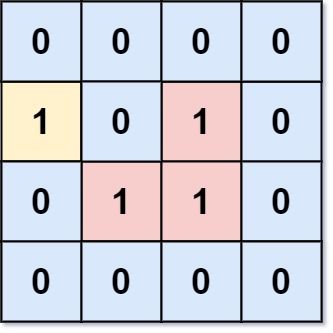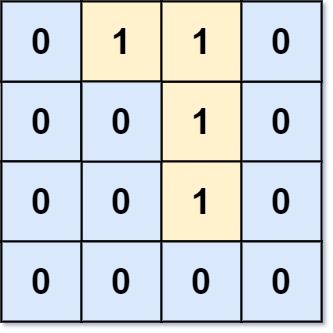You are given an m x n binary matrix grid, where 0 represents a sea cell and 1 represents a land cell.
A move consists of walking from one land cell to another adjacent (4-directionally) land cell or walking off the boundary of the grid.
Return the number of land cells in grid for which we cannot walk off the boundary of the grid in any number of moves.
Example 1:
Input: grid = [[0,0,0,0],[1,0,1,0],[0,1,1,0],[0,0,0,0]] Output: 3 Explanation: There are three 1s that are enclosed by 0s, and one 1 that is not enclosed because its on the boundary.
Example 2:
Input: grid = [[0,1,1,0],[0,0,1,0],[0,0,1,0],[0,0,0,0]] Output: 0 Explanation: All 1s are either on the boundary or can reach the boundary.
Constraints:
m == grid.lengthn == grid[i].length1 <= m, n <= 500grid[i][j]is either0or1.
Union find.
class Solution:
def numEnclaves(self, grid: List[List[int]]) -> int:
m, n = len(grid), len(grid[0])
p = list(range(m * n + 1))
def find(x):
if p[x] != x:
p[x] = find(p[x])
return p[x]
for i in range(m):
for j in range(n):
if grid[i][j] == 1:
if i == 0 or i == m - 1 or j == 0 or j == n - 1:
p[find(i * n + j)] = find(m * n)
else:
for x, y in [[0, 1], [0, -1], [1, 0], [-1, 0]]:
if grid[i + x][j + y] == 1:
p[find(i * n + j)] = find((i + x) * n + j + y)
res = 0
for i in range(m):
for j in range(n):
if grid[i][j] == 1 and find(i * n + j) != find(m * n):
res += 1
return resclass Solution {
private int[] p;
private int[][] dirs = new int[][]{{0, -1}, {0, 1}, {1, 0}, {-1, 0}};
public int numEnclaves(int[][] grid) {
int m = grid.length, n = grid[0].length;
p = new int[m * n + 1];
for (int i = 0; i < p.length; ++i) {
p[i] = i;
}
for (int i = 0; i < m; ++i) {
for (int j = 0; j < n; ++j) {
if (grid[i][j] == 1) {
if (i == 0 || i == m - 1 || j == 0 || j == n - 1) {
p[find(i * n + j)] = find(m * n);
} else {
for (int[] e : dirs) {
if (grid[i + e[0]][j + e[1]] == 1) {
p[find(i * n + j)] = find((i + e[0]) * n + j + e[1]);
}
}
}
}
}
}
int res = 0;
for (int i = 0; i < m; ++i) {
for (int j = 0; j < n; ++j) {
if (grid[i][j] == 1 && find(i * n + j) != find(m * n)) {
++res;
}
}
}
return res;
}
private int find(int x) {
if (p[x] != x) {
p[x] = find(p[x]);
}
return p[x];
}
}class Solution {
public:
vector<int> p;
int dirs[4][2] = {{0, -1}, {0, 1}, {1, 0}, {-1, 0}};
int numEnclaves(vector<vector<int>>& grid) {
int m = grid.size(), n = grid[0].size();
p.resize(m * n + 1);
for (int i = 0; i < p.size(); ++i) p[i] = i;
for (int i = 0; i < m; ++i)
{
for (int j = 0; j < n; ++j)
{
if (grid[i][j] == 1)
{
if (i == 0 || i == m - 1 || j == 0 || j == n - 1) p[find(i * n + j)] = find(m * n);
else
{
for (auto e : dirs)
{
if (grid[i + e[0]][j + e[1]] == 1) p[find(i * n + j)] = find((i + e[0]) * n + j + e[1]);
}
}
}
}
}
int res = 0;
for (int i = 0; i < m; ++i)
{
for (int j = 0; j < n; ++j)
{
if (grid[i][j] == 1 && find(i * n + j) != find(m * n)) ++res;
}
}
return res;
}
int find(int x) {
if (p[x] != x) p[x] = find(p[x]);
return p[x];
}
};var p []int
func numEnclaves(grid [][]int) int {
m, n := len(grid), len(grid[0])
p = make([]int, m*n+1)
for i := 0; i < len(p); i++ {
p[i] = i
}
dirs := [4][2]int{{0, -1}, {0, 1}, {1, 0}, {-1, 0}}
for i := 0; i < m; i++ {
for j := 0; j < n; j++ {
if grid[i][j] == 1 {
if i == 0 || i == m-1 || j == 0 || j == n-1 {
p[find(i*n+j)] = find(m * n)
} else {
for _, e := range dirs {
if grid[i+e[0]][j+e[1]] == 1 {
p[find(i*n+j)] = find((i+e[0])*n + j + e[1])
}
}
}
}
}
}
res := 0
for i := 0; i < m; i++ {
for j := 0; j < n; j++ {
if grid[i][j] == 1 && find(i*n+j) != find(m*n) {
res++
}
}
}
return res
}
func find(x int) int {
if p[x] != x {
p[x] = find(p[x])
}
return p[x]
}

